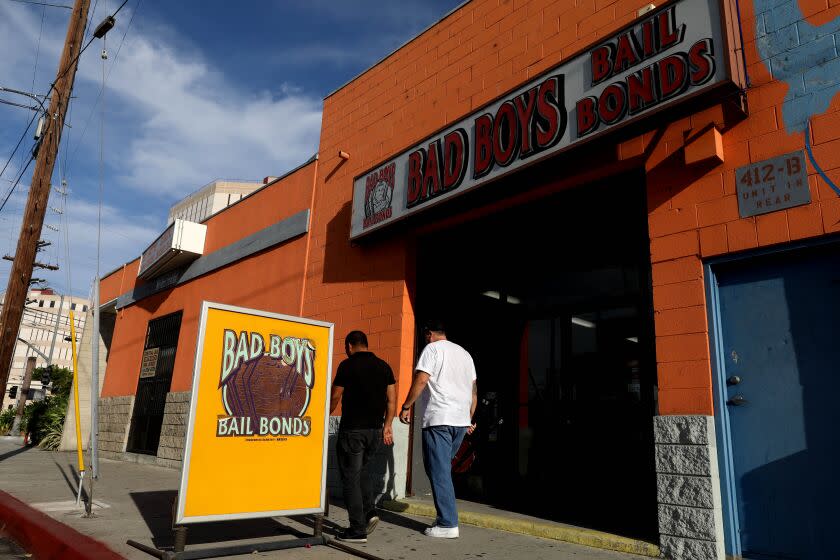Editorial: L.A.'s bail reform is an improvement, but falls short of what Illinois has done

On July 18, the same day the Los Angeles County Superior Court unveiled its plan to sharply scale back the use of cash bail in L.A. County, the Illinois Supreme Court went further, and better. It upheld legislation that eliminates cash bail altogether.
In its ruling, the Illinois court’s majority demolished arguments by police, prosecutors and the bail bond industry that cash bail is an ancient and constitutionally mandated feature of the criminal justice system.
Read more: Editorial: 50 Cent and prosecutors are wrong about cash bail. L.A. courts get it right
Yes, the court acknowledged, the state Constitution makes all arrested people “bailable by sufficient sureties” — legalistic jargon meaning they have the right to avoid jail or be released in exchange for some manner of deposit or pledge.
But that pledge could be something as simple as a promise to come back for trial. It never meant exclusively money, so the Illinois Pretrial Fairness Act, passed in 2021, does not improperly amend the Constitution by ending cash bail, the court ruled.
Read more: Editorial: Presumed guilty! The toxic cost of money bail
The key line of the legislation is straightforward and bracing: “The requirement of posting money bail is abolished.”
Illinois will become the first state to completely eliminate cash bail when the law takes effect Sept. 18.
California almost got there first. Legislation known as SB 10 was signed into law in 2018, at the same time the Illinois legislature was beginning its bail reform. Senate Bill 10 properly threw out money payments as the criteria that determine whether an accused person sits in jail or goes home before trial.
Read more: Editorial: California still violates the Constitution on bail
Instead, defendants accused of lower-level crimes were to be released with few conditions. Those charged with the most serious crimes would stay locked up, absent a judge’s ruling that they were OK to be released. And a middle group was to be evaluated based on an assessment of their risk to flee or harm the public if released. Money, deposited with or promised to the court, was to have nothing to do with it.
But the legislation meant oblivion for the bail bond industry, which mounted a full-scale attack and gathered enough signatures to require a referendum to suspend the law. In November 2020, voters said “no” to Proposition 25, keeping cash bail intact in California. Some voters no doubt were nervous about letting more people out of jail without posting bail, but many voters on the left also disliked the bill because they believed it gave judges too much power to do the opposite — detain people without bail.
Read more: Editorial: 'Zero bail' and release from jail are not the same thing
In any event, California blew what seemed at the time like the best shot at ridding its criminal justice system of one of its most horrendous features — liberty decisions based on a person’s wealth or poverty, rather than their risk to public safety.
Lawsuits kept progress on track. In 2021, the California Supreme Court ruled that a person could not be denied release from jail solely for being unable to pay the bail amount set by a judge. But the ruling did not apply to the first stage of the bail process: the period between arrest and the arraignment hearing, which often comes several days later.
Read more: Editorial: Court brings back sanity, and the Constitution, in Los Angeles bail ruling
Pre-arraignment cash bail is the subject of a preliminary injunction issued in Los Angeles County in May in the case of Urquidi vs. Los Angeles. It struck down cash bail, but only for people arrested by the Los Angeles Police Department or the L.A. County Sheriff's Department. People arrested by the county's dozens of other law enforcement agencies were unaffected.
The L.A. Court's new pretrial release protocol exceeds the Urquidi injunction, because it applies to the entire county. But it falls far short of the Illinois reform, because it keeps cash bail intact for some.
Read more: Editorial: Bail's purpose is freedom, not jail
People arrested for most nonviolent crimes will be cited by police, released and told to appear in court on the appropriate date. Some accused of more serious crimes will be brought to the station and booked before release. For a third category, release conditions will be set by magistrates based on the accused’s record and an assessment of the risk to public safety if they are freed before trial.
The magistrates will not conduct hearings and will not see or question the accused. That won’t happen until several days (or as much as a week) later, after the defendant is formally charged and appears in court for arraignment.
Read more: Editorial: How the poor get locked up and the rich go free
Money bail will still be a condition of release for people accused of the most serious crimes, such as rape and murder.
The L.A. Court’s new protocol is effective Oct. 1. Most of the rest of California will still use cash bail for most defendants.
The California Constitution, it’s important to note, has bail language very similar to Illinois’: “A person shall be released on bail by sufficient sureties….” Not cash bail, just bail. There’s no mention of money.
Read more: Editorial: Money bail punishes the poor and makes a mockery of California's justice system
There's an arguably contradictory provision in the California Constitution that makes public and victim safety the primary considerations in bail decisions. But it also doesn't specify money. So perhaps California can still adopt legislation with a line like the one in the Illinois Pretrial Fairness Act:
“The requirement of posting money bail is abolished.”
This story originally appeared in Los Angeles Times.

